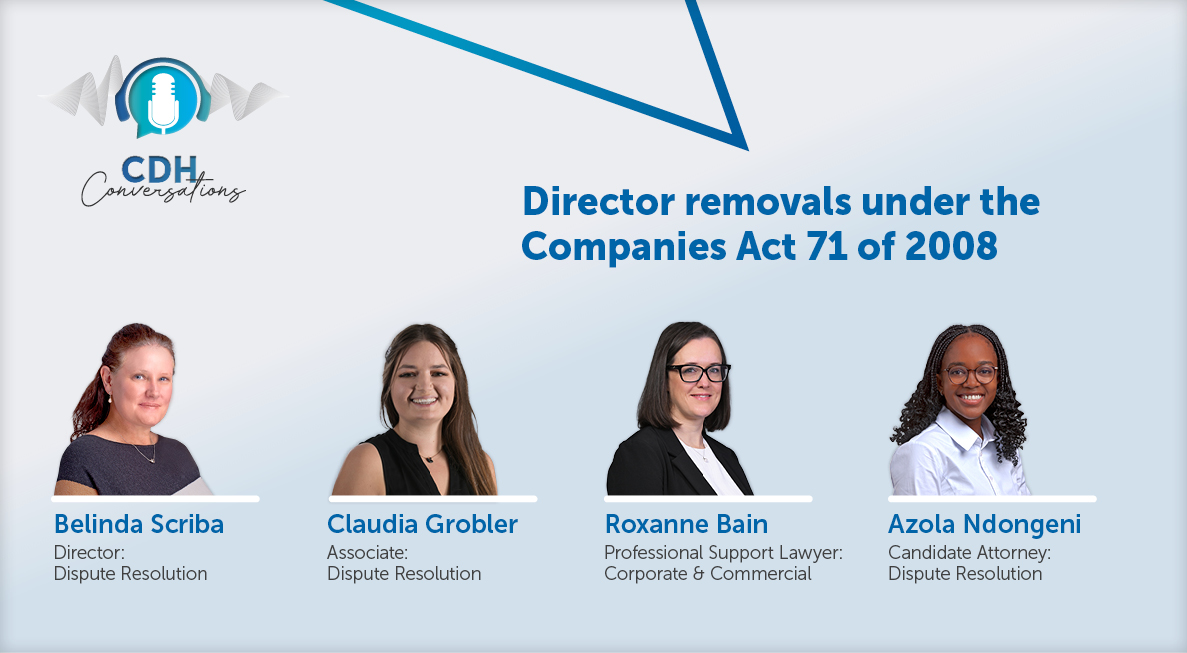Collective disciplinary inquiries – A new norm?
This concept was confirmed in the case of Dunlop Mixing and Technical Services (Pty) Ltd and others v National Union of Metalworkers of South Africa (NUMSA)obo Nganezi and others [2016] 10 BLLR 1024 (LC), where the Labour Court held that an employee bound implicitly by a duty of good faith towards the employer breaches that duty by remaining silent about knowledge possessed by the employee regarding the business interests of the employer being improperly undermined. The court further held, that on general principle, a breach of the duty of good faith can justify dismissal.
In recent times, derivative misconduct has commonly been applied in the context of strikes where there is a breach of picketing rules and an employer wishes to take action against the employees who fail to report breaches by their fellow employees of the picketing rules. The question that then arises is, how an employer proceeds with an inquiry involving a large number of employees. It is impractical to hold, for example, thirty individual inquiries. As a result, employers generally elect to hold collective inquiries.
The rationale for collective disciplinary enquiries is based on two principles. Firstly, that employees have acted collectively and associated themselves with an act of misconduct and therefore, they are charged collectively. It is sufficient that a particular employee merely witnessed the unlawful conduct. For example, should a group of employees intimidate a fellow employee, at his place of residence, for disassociating from the strike action, an employee who is present during this unlawful act associates him/herself with the unlawful conduct. Secondly, if the employee witnesses the conduct but does not participate in the intimidation, and fails to disclose this information to the employer, he/she may in addition be charged in the collective inquiry, based on derivative misconduct.
These are the guidelines generally applied by employers when conducting a collective inquiry pursuant to a strike:
- The provisions of the company’s Disciplinary Code and Procedure are followed in order to ensure procedural fairness. Such Codes are generally only a guideline and seldom provide for collective misconduct.
- Prior to the strike, the employer considers whether the employees’ contracts of employment incorporate a condition of employment, that the employees have a duty to disclose the wrongdoing of fellow employees. Such provisions may also be found in disciplinary and other codes.
- Prior to the strike or lock-out, the employer would ordinarily issue a general notice to alert employees to the rule regarding disclosure, as well as invite them to disclose any information, even on a continuous basis, however, with a cut-off date. The company’s hotline may also be utilised for such purpose. The notice would provide that a failure to do so may result in employees being charged on the basis of derivative misconduct.
- Proper mechanisms are put in place to collect evidence and identify employees who engage in misconduct during strikes.
- Witnesses are consulted with prior to charge sheets being drafted for each employee and employees are prosecuted where there is sufficient evidence to do so. Consistency in application of discipline is adhered to. Every charge in the charge sheet is supported by evidence which will allow for a finding on the basis of that charge.
- Measures are taken to protect the identity of witnesses who have reason to fear for their lives as a result of giving evidence. This includes providing the means for witnesses to give evidence in camera, and where necessary to employ the use of a voice distorter. A proper foundation is laid before the Chairperson in order to call witnesses in camera. A formal application is made and the requirements as set out in the case of National Union of Mineworkers and Others v Deelkraal Gold Mining Co Ltd (2) (1994) 15 ILJ 1327 (IC) are complied with. These requirements were discussed in our Employment Alert dated 29 June 2015, entitled ‘Inspecting In-Camera Evidence – A Process for Dealing with Fearful Witnesses’.
- An independent Chairperson is appointed to preside over the disciplinary proceedings so as to ensure impartiality and fairness. Often the independence of the Chairperson is later raised at arbitration.
- Employers ensure that they are sensitive when communicating with witnesses in the presence of other employees so as not to disclose their identity.
- Item 4(2) of Schedule 8 of the Labour Relations Act is complied with in respect of Shop Stewards who are being charged.
- The disciplinary hearing is interpreted into the accused’s mother tongue. This right is not abused to delay the proceedings and to frustrate the right of the employer to prosecute misconduct at the workplace. When an employee testifies, the employer affords the employee the opportunity to testify in their mother-tongue and appoint an interpreter for the employee. However, there is no interpretation of all the evidence led, into for instance, five different languages of the employees. The language policy as well as the education levels of the employees are considered.
- The employer does not allow for an appeal as this would require yet another chairperson, escalating the costs of the inquiry.
- The proceedings are recorded as the parties sometimes wish to rely on the record at future proceedings.
The information and material published on this website is provided for general purposes only and does not constitute legal advice. We make every effort to ensure that the content is updated regularly and to offer the most current and accurate information. Please consult one of our lawyers on any specific legal problem or matter. We accept no responsibility for any loss or damage, whether direct or consequential, which may arise from reliance on the information contained in these pages. Please refer to our full terms and conditions. Copyright © 2026 Cliffe Dekker Hofmeyr. All rights reserved. For permission to reproduce an article or publication, please contact us cliffedekkerhofmeyr@cdhlegal.com.
Subscribe
We support our clients’ strategic and operational needs by offering innovative, integrated and high quality thought leadership. To stay up to date on the latest legal developments that may potentially impact your business, subscribe to our alerts, seminar and webinar invitations.
Subscribe




